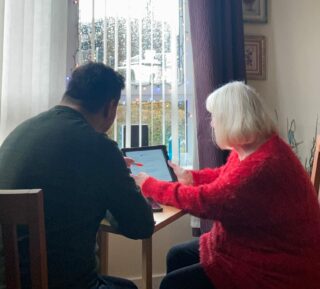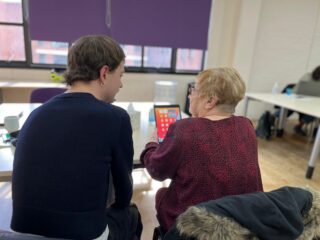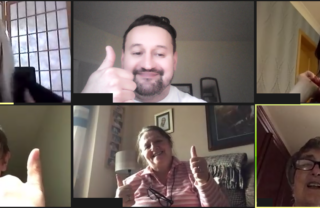Ofcom defines media literacy as the ‘ability to use, understand and create media and communications across multiple formats and services’.
Ofcom has a statutory duty to promote media literacy and make arrangements to carry out research into media literacy matters. The Digital Glasgow Strategy identifies a challenge to tackle the digital divide and deliver a range of targeted actions to increase digital inclusion and improve digital skills.
Ofcom research consistently finds that ‘narrow internet users’ (people who use the internet for a small range of activities) are more likely than others to struggle with online media literacy. They are therefore keen to support the effort in Glasgow and build on the existing digital inclusion work, like the GDA Connects project, to ensure that people are equipped with the media literacy skills they need to flourish online.
So what does that mean for everyday disabled people? As a GDA member says:
All information has a bias. Everyone has biases, and those biases will come out, whether you mean them to or not. That does make it harder to find accurate information.
Are you enabling people to develop the skills they need to identify accurate information?
In conjunction with Ofcom, we have created an inclusive media literacy resource to support people working in this area. This is for staff/volunteer development. It is not intended for direct delivery to service users.

This resource can help you to:
- Develop your own media literacy skills.
- Respond to people’s media literacy needs in a way that is inclusive and accessible.
- Ensure that services and projects are informed by and respond appropriately to the media literacy needs of both staff and local communities.
I do think that because everything’s going digital, it’s penalising people in poverty. If you’re struggling to buy food and pay your bills, having an internet connection’s a luxury, so that’s going to be the first thing that goes.
We cover:
- What is inclusive media literacy, and why does it matter?
- Are you a media literate professional?
- Inclusive media literacy in practice.
The resource also links to our related podcast, Media Literacy for Disabled People. Hear disabled people share their thoughts on and experiences of media literacy and digital inclusion:
I’m too old, stupid and disabled to learn. I feel left behind. Everything seems to be online now – from ordering prescriptions to paying bills. Even care these days seems to be getting delivered via iPads.
To access the resource, visit https://gda.scot/app/uploads/2024/10/GDA-and-Ofcom-Inclusive-Media-Literacy.pdf
To learn more about the GDA Connects project, visit https://gda.scot/gda-connects/
Thanks to Jess McBeath for your help developing this resource.

Related Articles
Care About Us: Disabled People in Glasgow Call For Radical Reform in Social Care Campaign
“Radical action is needed now to ensure disabled people are listened to and necessary changes are made to what social work themselves describe as a…
Read More
Stop Cuts to Social Care Budget!
Stop Cuts to Social Care Budget which will erode Legal Rights and Protections for Glasgow’s disabled and older people. This morning (Wednesday 22nd March), members…
Read More
Scottish Parliament Motion of support published
Pam Duncan Glancy MSP published a motion on 1 March 2022 to support Glasgow Disability Alliance and its recently released report, Transforming participation for disabled…
Read More



